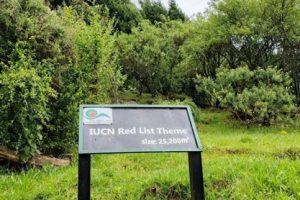Ethiopia’s biodiversity is nothing short of astounding. The country is home to a staggering number of species, many of which are endemic and found nowhere else on Earth. In fact, Ethiopia ranks among the world’s top biodiversity hotspots, making it a region of significant global importance for conservation.
The country’s geographical diversity is a key factor in its exceptional biodiversity. It is home to numerous distinct regions, each with its own unique climate, topography, and habitat. From the verdant rainforests in the southwest to the arid deserts of the Danakil Depression in the northeast, Ethiopia encompasses an incredible range of ecological niches.
One of the most remarkable features of Ethiopian biodiversity is its high level of endemism. Based on the various studies, over 6,000 plant species have been identified in the country, and an estimated 10% of these are found nowhere else on Earth. The Ethiopian Highlands, with their towering peaks and deep valleys, harbor a wealth of endemic flora, including the otherworldly giant lobelia and the striking Abyssinian rose.
It is also a haven for a stunning array of animal species. The Ethiopian indigenous animals, like the Simien fox, are an iconic symbol of the country’s biodiversity. It is the rarest animals in the world and is found only in the Ethiopian highlands. The gelada baboon, with its impressive golden mane, roams the grasslands in large troops, while the Ethiopian Highlands host the critically endangered Ethiopian ibex and the charismatic walia ibex. Furthermore, Ethiopia’s waterways and wetlands provide critical habitats for an abundance of aquatic species.
Despite the incredible richness of Ethiopian biodiversity, many species face significant threats. Habitat loss, deforestation, climate change, and unsustainable agricultural practices pose challenges to conservation efforts in the country. However, the Ethiopian government’s commitment to conservation, along with that of local communities and others, is evident in its extensive network of national parks and protected areas. These havens safeguard the country’s unique biodiversity, providing refuge for countless species facing threats such as habitat loss and climate change. Also, recognizes the importance of protecting this natural heritage and has implemented various initiatives to safeguard its biodiversity.
The Ethiopian Biodiversity Institute (EBI) Director, Melese Mariyo (PhD), recently held a media briefing to announce the 23rd celebration of International Biodiversity Day under the theme Be Part of the Plan.
According to Melese, the International Biodiversity Day celebration serves as a platform to raise awareness and stimulate action for biodiversity conservation. Biodiversity, the variety of life forms on Earth, plays a crucial role in sustaining ecosystems and providing benefits to humanity, including food security, medicinal resources, economic opportunities, and climate resilience.
The global biodiversity framework, consisting of 23 targets, guides efforts towards halting biodiversity loss and promoting sustainable use of natural resources by 2030. Ethiopia has developed 19 targets, emphasizing societal and community engagement to protect and restore ecosystems, combat climate change, promote sustainable agriculture and fisheries, and ensure equitable benefits from biodiversity use, he remarked.
He stated the critical importance of conserving and protecting biodiversity, particularly in the present era. Biodiversity plays a vital role in sustaining ecosystems and providing a wide range of benefits to humanity, including essential ecosystem services, food security, medicinal resources, economic opportunities, cultural heritage, climate resilience, and aesthetic enjoyment. Conserving biodiversity is not only a moral imperative but also a wise long-term investment in the sustainability of our planet.
Ethiopia’s rich biodiversity serves as a crucial hub of genetic diversity and endemism. The Ethiopian Biodiversity Institute, as a governmental entity, has the responsibility to safeguard biodiversity, ensure sustainability and fair access to genetic resources, and promote equitable sharing of benefits. Over the years, the institute has expanded its mandate to encompass various biodiversity sectors, including crops, forests, rangeland species, animals (both domestic and wild), microbial genetic resources, and biosphere reserves.
As the advisor to Agriculture Minister Tarekegn Tsige, the EBI has achieved significant milestones since its establishment. It has established seven biodiversity centers, three botanical gardens, and a duplicate gene bank in the country. The institute has also implemented conservation efforts under several initiatives that have been undertaken in Ethiopia to promote the well-being of the country and its people.
He further stated that over 30 community seed banks have been established, along with 28 forest gene banks that include medicinal plant gene banks. Additionally, there are 16 indigenous cattle protection centers as well as 15 sanctuaries dedicated to the preservation of wild and aquatic animals. Furthermore, five crop field gene banks have been set up, resulting in the collection of more than 70 varieties. The Central Gene Bank of Ethiopia has successfully organized and safeguarded over 9,000 hot plant accessions.
However commendable these efforts are, it has become evident that there are limitations in implementing them within the desired scope and timeframe. Therefore, it is crucial that we prioritize the expansion of these ongoing initiatives to ensure maximum benefits for our country and its people. He noted that by placing special emphasis on further developing and enhancing these projects, we can address the existing limitations and achieve more substantial outcomes.
The EBI advocates for initiatives like the Green Legacy, National Biodiversity Strategies and Action Plans, and ecosystem restoration to address the challenges facing biodiversity. Mobilizing resources and fostering multi stakeholder engagement are crucial to safeguarding Ethiopia’s biodiversity, which is essential for the country’s environmental, economic, and social well-being. Moreover, Ethiopia has made significant efforts in reforestation and forest conservation to combat deforestation and habitat loss. Ethiopians planted more than 32.5 billion seedlings during the past five years.
Ethiopia’s efforts were not only limited to the national level but also participated on the continent. The country has set ambitious targets to restore degraded lands and increase forest cover. One notable initiative is the Great Green Wall, a pan-African project aimed at creating a green belt of trees across the Sahel region. In Ethiopia, this initiative involves planting trees along the country’s northern border to combat desertification and restore biodiversity.
To mitigate the negative impacts of agricultural practices on biodiversity, Ethiopia has implemented sustainable agriculture and land management strategies. These initiatives promote practices such as agroforestry, terracing, and soil conservation to reduce soil erosion, improve water management, and preserve biodiversity.
Furthermore, Ethiopia actively engages in international collaborations and partnerships to enhance its conservation efforts. It collaborates with international organizations, such as the United Nations Environment Program (UNEP), the World Wildlife Fund (WWF), and the African Wildlife Foundation (AWF), to access technical expertise, funding, and resources for effective conservation planning and implementation.
Melese emphasized that everyone has a role to play in biodiversity conservation and restoration. Policymakers, scientists, educators, and citizens all have a part to contribute. Engaging in the plan involves transformative change in attitudes, policies, practices, and governance structures. It also requires strategies such as community engagement, ecosystem preservation, policy advocacy, climate change adaptation, public education, integration of traditional knowledge, sustainable resource use, technological innovation, adaptive management practices, and collaborative partnerships. Additionally, by working together, embracing transformative change, and taking decisive action, we can ensure a brighter and more sustainable future for generations to come.
Besides, Ethiopia’s biodiversity is a testament to the country’s ecological significance and natural wonders. Its unique mix of habitats and climatic conditions has fostered the evolution of countless species, making it a treasure trove for scientists, conservationists, and nature enthusiasts alike. Preserving and safeguarding this remarkable biodiversity is not only crucial for Ethiopia but also for the global community, as it represents an irreplaceable part of our planet’s natural heritage.
BY FIKADU BELAY
THE ETHIOPIAN HERALD SUNDAY EDITION 19 MAY 2024





